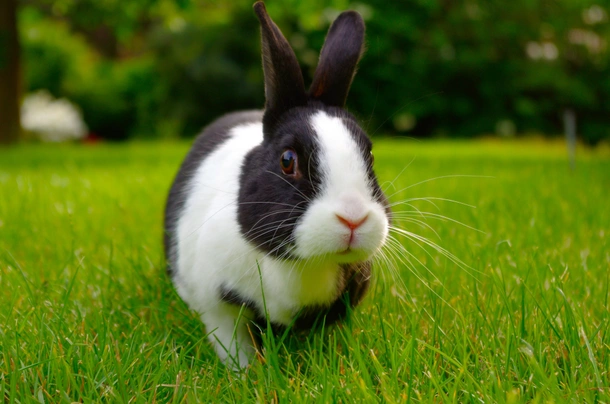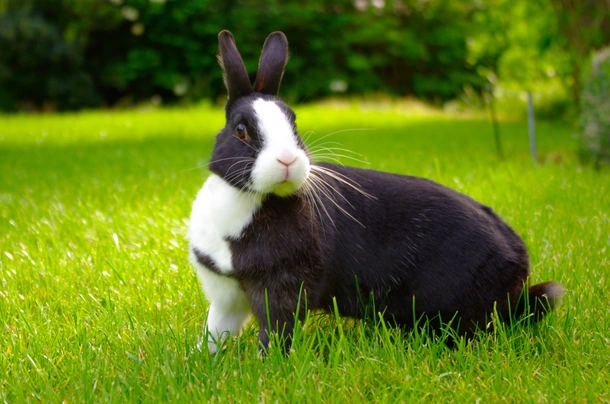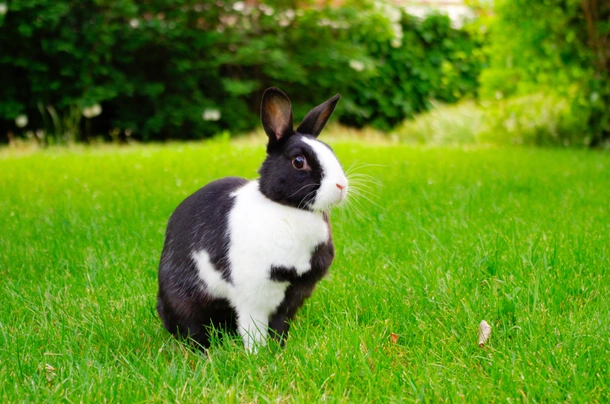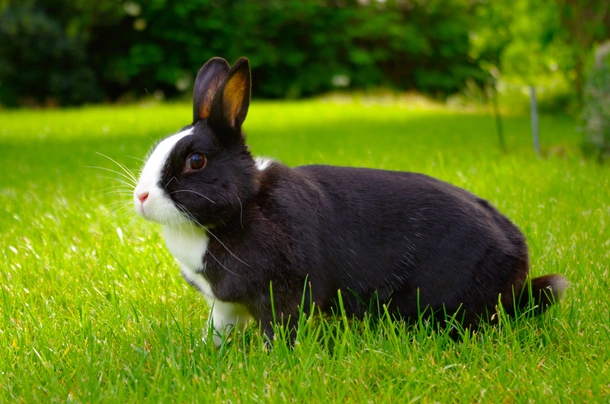Dutch
Introduction of the Dutch
The striking Dutch is one of the most popular rabbit breeds. Contrary to popular belief, it did not originate in Holland, but the UK. For a long time it was the most popular choice for pet owners, but the emergence of the dwarf breeds saw it fall out of favour, however it remains one of the world’s 10 most popular rabbit breeds to be kept as a pet.
History of the Dutch
In the early part of the 19th Century many rabbits were imported into the UK from Belgium for the meat market. Among these animals was a breed known as the Petit Brabançon, which often displayed the instantly recognizable Dutch colourway and can be seen in pieces of art from Belgium dating from as far back as the 15th Century.
The Dutch has its origins in this old breed and its attractive markings meant that some breeders kept some of these animals in order to ‘fix’ the gene responsible for the distinctive coat, creating the rabbit with the coloured and white markings we know today.
Appearance of the Dutch
- Main colourways: black, chocolate, steel, blue, grey or tortoise (all with white base colour)
- Average weight: 2kg
In the US, the breed standard demands a small or medium animal that has a rounded, compact body and a round head. The ears are short, well-furred, and robust and stand upright. The fur is soft and short. It has very powerful back legs which are much longer than the front.
The coat is always white with the addition of another colour – usually black, blue, grey or chocolate. The markings are symmetrical with a white blaze, front and hind legs as well as a white bib. The coloured patches cover the cheeks, ears and eyes. He has a short, soft coat that should be very shiny.
Temperament of the Dutch
This is an animal that is intelligent, playful but generally docile and gentle, and as such makes a great pet for adults and children alike. Young children should be supervised when handling any animal, but providing they are careful, the Dutch will tolerate the attentions of younger children very well. Any rabbit will be naturally fearful of being picked up so it’s important that when potential owners set out to look for a new pet, that they find one that has been handled regularly (and carefully!) from an early age to get it used to human company. Their gentle, trainable nature also means they can learn their name quickly and will come when called. If they are given the time to get used to human company they will love nothing more than sitting on a lap enjoying a cuddle. The Dutch will not be shy with his affections.
As they are such intelligent creatures they can demand a lot of attention and get bored very quickly, but by giving them plenty of attention and lots of toys to play with you can alleviate their boredom. The Dutch is also easily trained so by spending time teaching your pet to use a litter tray, or stand in his hind legs, you will also help to keep him occupied.
All rabbits are very delicate animals, hence the need to handle them carefully. However, it should be remembered that if they are startled, their instinct is to run away. If you are holding a rabbit and it’s startled, it will attempt to flee and in order to do that he will kick out with his immensely powerful back legs. This will have the effect of propelling him forward and unless you are very strong, with a very high pain threshold (his back feet have claws remember!); he will get away from you and could fall to the floor causing injury.
Health of the Dutch
Dental problems are the most likely cause of health concerns in the Dutch. All rabbits can suffer with overgrown molars and enamel spurs as their teeth grow continuously and if they are not offered a diet designed to help wear the teeth down, they can develop problems. Overgrown molars and spurs can cut into the cheeks or tongue, causing pain and making it difficult for the animal to eat. Injuries within the mouth can go undetected for some time and can become infected, causing abscesses which will need veterinary treatment. It’s important to check your rabbit regularly to ensure he is maintaining his weight and is eating properly. Any difficulty when eating or unexplained weight loss may be due to overgrown teeth.
All rabbits should be wormed regularly and treated for ticks and fleas. They should also be vaccinated annually for myxomatosis and Viral Haemmorhagic Disease as these are highly infectious conditions that can be fatal.
Rabbits should be fed a diet that’s appropriate for their age, type and activity level and they should not be allowed to become overweight. A rabbit that’s too big will have difficulty grooming itself and could become susceptible to flystrike. Flystrike occurs when flies become attracted to soiled areas on the animal – particularly around the rear end, where they will lay their eggs and the resulting maggots can cause injuries to the rabbit that will need medical treatment.
Caring for the Dutch
Any rabbit will require a sturdy, waterproof hutch that’s situated out of the wind and full sun. The hutch should be large enough for your animal to hop around and stand on his back legs and it must have a covered area where he can escape the worst of the weather or have a quiet snooze. A cover for the front of the hutch will also help protect him from strong winds and driving rain.
The hutch should be lined with appropriate substrate such as sawdust or shavings and should be cleaned out thoroughly once a week. Droppings should be removed daily.
If he’s going to be a house rabbit then anything not designed to be chewed (cables and wires in particular!) should be kept well out of the way. He should be trained to use a litter tray and must be provided with a cage or area where he can get away from the noise of family life if he chooses.
Rabbits have very specific needs when it comes to diet. They should be fed fibrous green vegetables such as cabbage, kale, nettles and dandelions which will help keep their teeth worn down, and they should also be offered high-quality rabbit pellets and lots of good hay. This high-fibre diet will keep his digestive system happy and keep his teeth neat and tidy.



